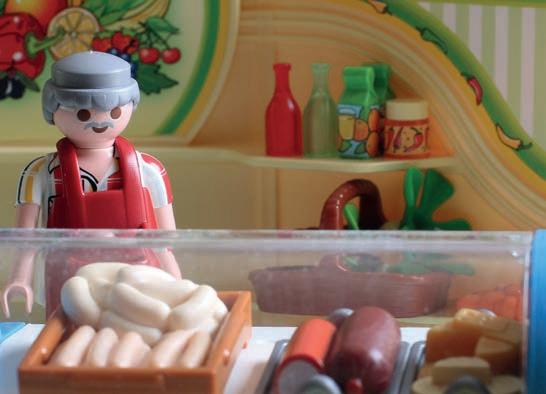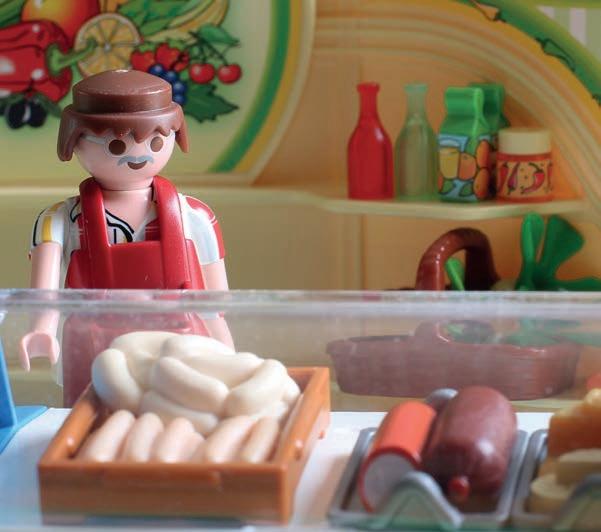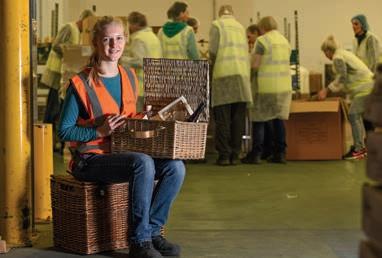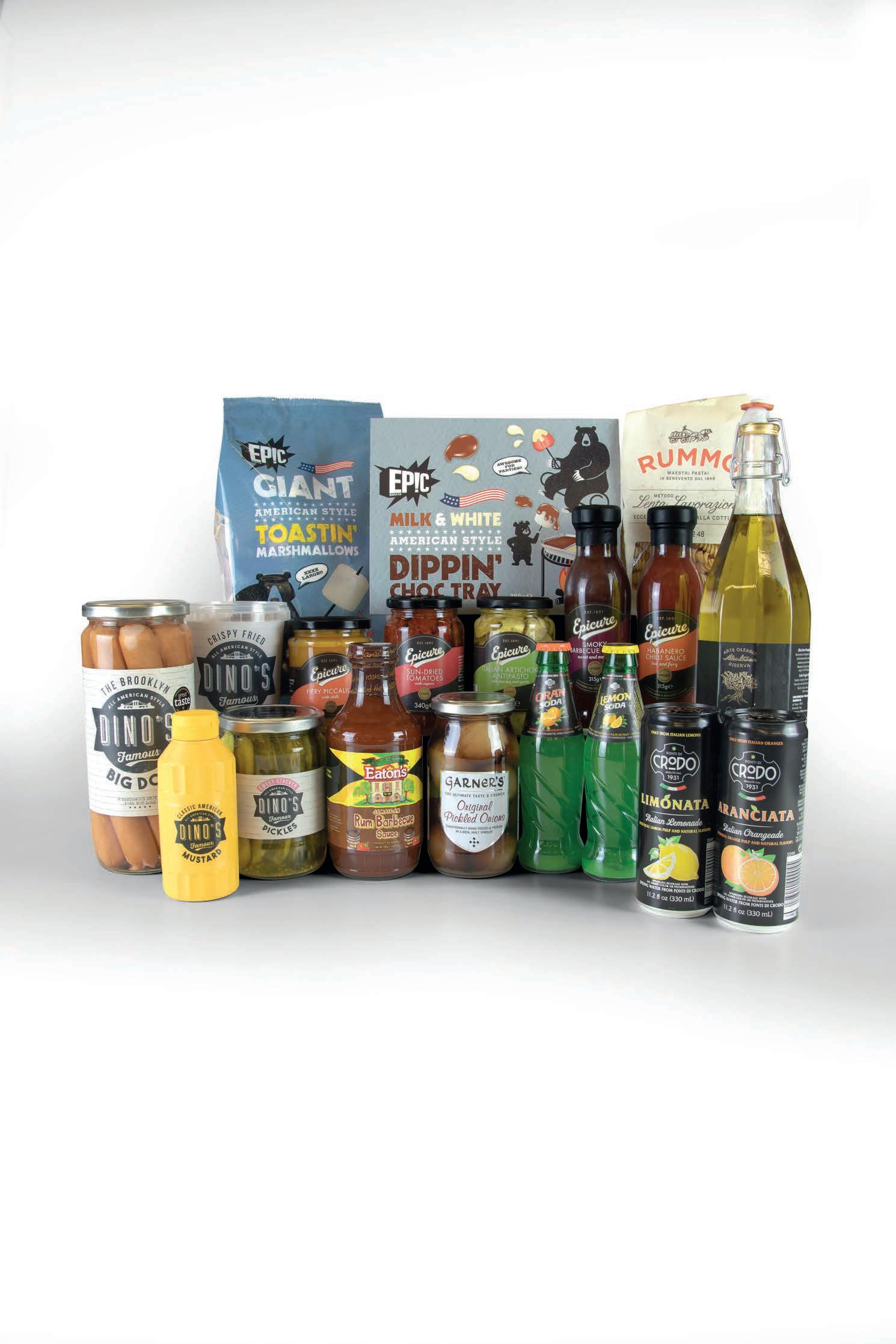
16 minute read
SHOP TALK
from FFD April 2021
IF I’D KNOWN THEN WHAT I KNOW NOW...
ELLA SMART, co-owner, Ben & Ella’s Farm Shop, Halstead, Essex
In March 2020, coronavirus arrived and we had to adapt, refocusing the shop around a faster and simpler service experience. Then, a few months later, hot weather followed by flash floods meant that the soak-away behind the shop failed and pushed water through the back walls. We had to close for two weeks to repair all the damage. These things taught us an important lesson: you can never plan for everything. You just need to be flexible and determined – no matter how hopeless a situation may appear.
But I would still say that the biggest challenge we have faced was getting our premises retailready in the first place. The old grain store we set up in is a Grade II listed barn with uneven floors and woodworm. It required extensive renovation and structural engineering.
The actual business of running a farm shop plays to our combined experience, which is perhaps why this aspect came more naturally. Prior to opening the farm shop, Ben and I were running a wholesale bakery and working market stalls around Hertfordshire and Cambridgeshire. Before that, we worked together in Michelin restaurants – Ben as a pastry chef and me as front-of-house management.
We are both very environmentally conscious and wanted a business that would reflect that. We decided from the outset that we were going to be palm oil-free. We stand by that decision 100%, although it has been a challenge to find like-minded suppliers and has, at times, cost us customers. Our made-to-order cakes, for example, are made with butter, and therefore cost slightly more than the same products made with palm oil.
Our original vision was for a luxury-oriented shop. However, with time, we have found ourselves moving to more of an essentials shop, stocking all the items you might find in a supermarket while maintaining our core values. We are also bigger than we ever expected to be.
In October 2019, less than a year in, we took on a second barn opposite our shop, expanded into ethically sourced homewares and gifts and brought our bakery on-site. In hindsight, we should have incorporated the bakery into the shop from the start instead of operating it off-site as a separate wholesale business. Since bringing it over we have seen a huge increase in demand for bread and bakery items. Fresh bread is our best-seller, along with cheese from our all-British counter.
After two years of trading, the business is turning over £400,000 and has just started to turn a profit. We’d like to look at opening satellite shops in surrounding villages, but first, our focus has to be consolidating and growing our customer base.
CONFESSIONS OF A DELI OWNER
ANONYMOUS TALES FROM BEHIND THE COUNTER
NOW THAT IT might nally be coming to an end, I’ve been wondering if there is anything I’ll miss about lockdown. So much of the last 12 months has been against the tide, never getting a chance to look around and take stock. It was always in your face, like a drunk in a night club.
My partner and I talk about dropping balls all the time – completing over half of the tasks I face every day without breaking something is the new de nition of success.
What was it Douglas Adams said? “I love deadlines. I love the whooshing noise they make as they go by.” My to-do list has become that. Whoosh, whoosh, whoosh, as another promise falls out of the bottom of the in-tray.
Can I take a moment to envy those people on furlough who have been doing bugger all for the last year? I know it’s not been easy for them, but a bit of furlough would have been nice. Just a couple of weeks to binge box sets while pretending to study Japanese, train for a triathlon or learn to play the trumpet.
My guess is most people reading this have had a pretty full-on 2020-21, working twice as hard with half the team, half the money or both.
So here’s my plan. Let’s lobby the Government – that Rishi Sunak seems like a nice chap – and instead of extending furlough for the people whose jobs haven’t come back yet, they can come and do ours for a bit. We can take a break before we all go back to normal. I know that won’t really work for nurses and doctors – bit of a skills gap there – but most publicans could do my job, at least until May.
I’ll drop in once a week and keep them on the straight and narrow.
I’ll pick up my furlough check and get started on some Net ix a er breakfast, followed by some midday trumpeting, then a bottle of wine with lunch. Don’t ask me what happens a er that. I’m getting to the age where a nap takes up the full a ernoon.
So, is there anything I want to take away from my own lockdown experience? Not really. The normal stu about Zoom being the new telephone, and that meeting producers online is good. I have really liked the li in the community – I’ll keep that. Quite a lot less squabbling in town council meetings. My various attempts at pivoting? Well, most of those will go in the bin.
I’ll look forward to the simplicity of selling cheese to customers who actually come into the shop and stay for a chat, without feeling the pressure of the queue of masked banditos trailing down the street at two-metre intervals.
There is one thing I have gained – a bit of pride. We’ve survived. And we worked hard. That’s what I did during COVID. I’ll settle for that.
MODEL RETAILING SOLVING EVERYDAY SHOPKEEPING DILEMMAS. IN MINIATURE.
How it started…

Right, we’ve got less footfall and everyone’s wearing a mask but it’s going to be ok. We can pivot with delivery services and food-to-go until everything’s back to normal. I’m looking forward to that day already... How it’s going…
Do we really have to allow more customers into the deli? How many covers should we have in the café? If they make me take my mask off, I’ll have to start smiling at rude customers. What’s wrong with the new normal anyway?
FFD says: After such a long period of time trading through the pandemic and various restrictions, it’s only natural that retailers will be slightly anxious about the UK returning to (some kind of) normal. Don’t forget that many of your customers will probably be feeling the same uncertainty, so try not to put too much pressure on yourself or your staff as you move towards fully reopening.

THE DELI DOCTOR
Paul Thomas
Technical and regulatory advice from the Guild of Fine Food’s deli helpline
Q: How can we demonstrate that the shelf life
of ready-to-eat foods, such as cooked meats, that we prepare in-house for retail sale is appropriate?
A: Some ready-to-eat foods are able to support the growth of Listeria monocytogenes, which is the principal microbiological hazard associated with chilled foods due to its ability to grow under refrigerated conditions. In some cases the food may have physicochemical properties, such as pH or water activity, which prevent the growth of this organism and can justify longer shelf lives. In other cases, the food will permit growth of this organism and these foods are usually stored in the refrigerator, with an appropriate shelf life to prevent growth of Listeria as well as spoilage organisms. These foods often have a use-by rather than bestbefore date.
Determination of shelf life can be complex. It may be advisable to seek advice from a food safety professional to conduct a thorough assessment of the potential for growth of harmful bacteria in the food. Additionally, some microbiological analysis will be necessary to

verify the shelf life determined.
Regulation (EC) 2073/2005 requires a minimum of five 25g samples in the case of Listeria monocytogenes where the purpose of testing is to “assess the acceptability of a batch or process”. In the case of verifying a process (or shelf life), it may be possible to draw these samples from more than one batch. If the samples are taken from a food at or after the use-by date, then this provides evidence to support the shelf-life determination.
Depending on the type of packaging (for example, vacuum packing) or the type of food, it may also be necessary to test against other chemical or microbiological parameters. Your laboratory or a technical adviser may be able to offer guidance on this
Dairy and food safety specialist Paul Thomas runs the Guild’s e-helpline for retailers with technical or regulatory queries. Send your questions to myguild@gff.co.uk
Expert’s eye
SAPPHIRA WATERSON
OF GRADUATE TRAINING SPECIALIST MANAGEMENT DEVELOPMENT SERVICES ON HIRING FROM GENERATION Z
With a thirst for variety, responsibility and selfimprovement, who could be a more perfect fit for the fast-paced fresh food industry than Gen Z?
This group – those born in the late ’90s – is sometimes referred to as a snowflake generation for their perceived lack of resilience and oversensitivity, but that annoys me.
They have been in the workplace for a few years now and – having placed more than 150 of them as trainees – we’ve had an insight into how they tick. They have certain demands and priorities, but employers who recognise how they can get the best out of these twenty-somethings will be repaid with hard work and fulfilled, productive employees.
Gen Z-ers are not solely in it for the money, they want a fun place to work where they feel valued. They like to be given responsibility and accountability but also thrive with regular check-ins from managers and colleagues, even if it’s just for five minutes.

You are more likely to see this generation work fewer hours, but their work time will count.
Keep them interested with variety in their roles and talk openly about the opportunity for their progress in the business, and you might just have a future manager on your hands.
Bear in mind that Gen Z prioritises mental and physical wellbeing, and where baby boomers would have worked late to be seen to be diligent, you are more likely to see this generation work fewer hours to maintain their health and happiness, but their work time will count.
WHAT’S TRENDING
1 NICK BAINES KEEPS YOU UP TO DATE WITH THE NEWEST DISHES, FLAVOURS AND INNOVATIONS IN FOOD & DRINK
2
3
1 ‘Chocuterie’ boards There’s been a surge of elaborate chocolate sharing boards appearing across Pinterest and Instagram of late, with many savvy retailers capitalising on it during lockdown. While plenty of these ‘chocuterie boards’ are based around a hot chocolate, there’s opportunity to take this up a notch in the fine food sector, exploring criollo, triniterio and forastero cocoa varieties. With the UK spending around £4billion each year on confectionary, the chocolate ‘flight’ or tasting board would work well for home delivery, retail and foodservice businesses.
2 Amchoor According to Waitrose’s trend predictions, this north Indian spice is going to be big this year. Made from dried green mangoes, the powdered ingredient adds vibrance, sourness and tartness to dishes without increasing the moisture content. As well as being found in regional masala spice blends, amchoor is finding its way into grilled seafood dishes and an abundance of cooling smoothie bowls and juices that provide a mainstay of summer menus. Seasoned Pioneers (pictured) are among the producers offering this blend.
3 Chilli oil revival The Guardian recently reported on the current boom in chilli oil sales, including online retailer Sous Chef’s whopping 1,900% increase in sales of a certain cult icon of the chilli world. The product is Lau Gan Ma chilli oil which seems to have stepped in where sriracha left off, featuring in a barrage of dishes across home and professional kitchens. Across the pond, chilli crisps (oils containing a slurry of dried chillies) are swelling in popularity with lines being launched by restaurants Momofuku and 886. Closer to home, we have the likes of London’s Tonkotsu and its Eat The Bits, which contains dried chilli flakes, miso, garlic, sesame and Japanese spice mix shichimi togarashi.
SHOP TALK
What we can learn from Amazon

NIGEL BOGLE OF THE EPOS BUREAU SAYS THE TECH GIANT’S USE OF DATA IS SOMETHING ALL INDEPENDENTS COULD TRY TO EMULATE
There is no arguing that the plethora of cameras, sensors and artificial intelligence that combines to bring Amazon Go to life is extremely impressive but I don’t see – or want, frankly – this tech popping up in my local deli any time soon. Surely, part of the sheer joy of going to a deli or cheesemonger is for the customer experience and I believe this is ‘known’ before consumers visit. That said, I believe independents right across the food LIKE THEM OR loathe them, Amazon can be retail spectrum need to get themselves ‘EPOS fit’ in admired for its ability to adapt to the shifting retail an increasingly challenging retail climate. climate and, more than being predictors of the For years, we have urged people to stop future, they have actively set out to create it by wasting money on generic till systems and instead pioneering a variety of tech; streamlining how we invest in sector-specific EPOS technology which acquire and engage with products and information understands the nuances of running a food across different sectors. retail business. Ingredients, allergens, wastage,
In my view, a large contributor to their success transferring products between departments, has been their obsession with information. It is understanding which customers spend, what they official, data is now more valuable than oil. buy and what they don’t buy. With the right EPOS
Within Amazon, vast amounts of customer, system, it’s all there and it’s easy to interpret. product and purchase data are analysed every There is a lot of what you might call “data second of every day with the blindness” in the sector and intention of making online buying unlocking this is the key to processes, faster, simpler and getting businesses in good incrementally more relevant to the consumer. I don’t actually think shape should Amazon (or anyone else) ever decide
Does this mean that with the that competing with that today is the day they launch of a bricks-and-mortar presence on the UK high street independents is set their sights firmly on the independent food retailer. – the pilot Amazon Go store in Amazon’s short-term An EPOS system that Ealing – that all independents should pack up and go home? In objective properly understands food retail can immediately short, I don’t believe so, at least transform your ability to not in the speciality food space, engage with your customer and I don’t actually think that and enable you to make their competing with independents is Amazon’s short- experience more informed and enjoyable. term objective. By all means be impressed by the technology
I’d be more concerned for the likes of Tesco on show at Amazon but don’t forget, at the end of and ASDA at this particular time, because this the technology rainbow, it’s all about the data and technology has the potential to eradicate queues what you do with it to keep your customers coming and automatic tills, The phrase “Unexpected item in back through the door. the bagging area!” may soon be a thing of the past. theeposbureau.com
The power of ‘free’
COLD BATH DELI’S TRACEY
TANNENBAUM
SAYS SOMETIMES YOU HAVE TO TAKE A HIT TO KEEP CUSTOMERS HAPPY
When a customer is unhappy, act immediately. If you can replace the item in question, do it quickly. A cold cup of coffee, for instance, can be swiftly rectified by a hot one and an apology.
If, however, there is no quick solution – then the best response is to refund immediately. Don’t argue, just give them their money back. And send them away with a free brownie.
I can hear you screaming ‘Free?!? That will cost me 75p every time there’s a mistake, plus what I’ve lost by comping the meal!’
Yes, that’s right. There is a cost, but in this case, there’s a benefit. You’ve acknowledged there’s an issue (respect). You’ve done something about it (refund) and you’ve given them a sweetener to return (brownie). In other words, there’s more of a chance of the customer forgiving you.
Make sure you have a set policy on refunds and customer service systems. I’ve seen managers and owners argue in front of customers about whether or not to deduct a small amount from a bill. It’s not a good look. Have some rules and avoid making a bad situation become an angry one.
This might all seem like common sense, but how often have you – as a customer – had a problem where there was no resolution? I bet pretty often.
Accounting advice
FLEUR LEWIS, HEAD OF FOOD AT BISHOP FLEMING, HAS SOME POINTERS ON TAX PLANNING
Many tax planning ideas can be used throughout the year, but as 5th April (and the end of the tax year) draws near, there is an opportune moment to make sure your tax affairs are in order. Here are five suggestions for you to consider for your business:
Expenditure
Consider bringing forward revenue and capital expenditure to secure earlier tax relief, subject to commercial considerations. But be aware of the new 130% super deduction on qualifying capital expenditure incurred between 1st April 2021 and 31st March 2023, which could be more advantageous. Capital expenditure on plant and machinery for the business of up to £1m could be 100% relieved under the Annual Investment Allowance. This is already in place and is in addition to the super deduction. If you’re engaged in research or improvements to processes, it may be entitled to relief in the form of enhanced tax deductions or payable credits.
Losses
Trading losses, subject to conditions, can be set against other income. Making the right claim for loss relief can result in maximum tax relief and improved cashflow.
Record keeping
Making improvements to how you manage the finances of your business and record keeping can help to improve profitability and cash flow. Adopting a digital accounting solution will help you comply with Making Tax Digital for VAT.
Salary and pensions
Where possible, a portion of salary could be sacrificed for pension contributions, childcare, low emission cars and health-related benefits (such as cycling to work). Such arrangements save National Insurance Contributions and can save income tax where the sacrifice brings personal income to below £100,000.
Directors of family companies can minimise tax bills by taking a combination of salary, dividends, and benefits in kind. Dividends remain slightly more tax efficient than salary, but their payment needs to be carefully considered.
Off-payroll working
The IR35 off-payroll working rules apply to payments made for services provided by a contractor on or after 6 April 2021. So it will be important to have in place the right procedures to comply with the new regime. It will also be necessary to ensure any fee invoices correctly state what work was carried out before and on/ after 6th April 2021.








